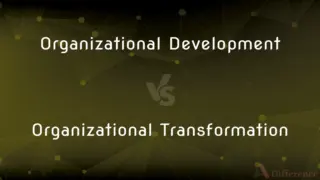TQM vs. QMS — What's the Difference?
Edited by Tayyaba Rehman — By Fiza Rafique — Published on January 13, 2024
TQM focuses on holistic quality improvement; QMS is the structured framework for managing quality. Both aim at delivering quality but differ in approach and scope.

Difference Between TQM and QMS
Table of Contents
ADVERTISEMENT
Key Differences
TQM, or Total Quality Management, is a management philosophy that emphasizes continuous improvement in all aspects of an organization. QMS, on the other hand, stands for Quality Management System, which is a set of policies, processes, and procedures required for planning and execution in the core business area of an organization. TQM believes that quality is the responsibility of all members of an organization and it focuses on long-term success through customer satisfaction. In contrast, QMS focuses on providing a structured framework that ensures products or services are consistent and meet regulatory standards.
While TQM revolves around a holistic approach to quality, ensuring that every aspect of an organization works towards continuous improvement, QMS is more about the systematic processes set in place to achieve quality objectives. TQM places a significant emphasis on organizational culture and believes that a shift in mindset is crucial for achieving quality excellence. QMS, however, is more about documentation, audits, and compliance to ensure quality deliverables.
TQM stresses employee involvement, teamwork, and empowerment as vehicles to drive quality improvements throughout an organization. QMS, in its essence, highlights the importance of documentation, standardization, and certification, ensuring that quality procedures are being followed rigorously. While TQM may look at long-term strategic changes in the organization to improve quality, QMS provides the tactical tools, techniques, and procedures to achieve and maintain the desired quality level.
In essence, TQM is about changing organizational culture and attitude towards continuous improvement in quality, while QMS provides a blueprint or framework that organizations can follow to maintain and achieve quality. Both TQM and QMS are critical for organizations aiming for quality excellence, but they operate on different spectrums of the quality continuum.
Comparison Chart
Definition
Management philosophy
Set of policies, processes, and procedures
ADVERTISEMENT
Focus
Continuous holistic improvement
Consistency and regulatory compliance
Main Components
Employee involvement, teamwork, empowerment
Documentation, standardization, certification
Approach
Cultural and strategic changes
Systematic and procedural
Goal
Long-term success through customer satisfaction
Meeting set quality standards and objectives
Compare with Definitions
TQM
Focuses on long-term success through customer satisfaction.
With TQM, we prioritize our customers' feedback.
QMS
Provides tools and techniques to maintain quality.
The new software integrates seamlessly with our QMS.
TQM
A holistic approach to quality management.
TQM involves every department working collaboratively.
QMS
Policies and procedures to achieve quality objectives.
The QMS guidelines helped streamline our operations.
TQM
A culture-driven approach to quality.
TQM demands a shift in mindset across all levels.
QMS
A structured system for ensuring product quality.
We implemented a QMS to maintain our product standards.
TQM
Believes in empowering employees for quality improvement.
TQM has led to our employees taking more initiative.
QMS
Emphasizes documentation and regulatory compliance.
Regular audits are a part of our QMS.
TQM
A philosophy emphasizing continuous improvement.
Our company adopts TQM to enhance overall performance.
QMS
A blueprint for achieving desired quality levels.
The organization relies heavily on the QMS for consistency.
Common Curiosities
What is the primary goal of TQM?
TQM aims for continuous holistic improvement and long-term success through customer satisfaction.
Why is documentation vital in QMS?
Documentation in QMS ensures consistency, regulatory compliance, and provides a reference for audits.
What does QMS primarily consist of?
QMS comprises policies, processes, and procedures to ensure product or service quality.
Are there certification standards for QMS?
Yes, ISO 9001 is a well-known international standard for QMS.
Which approach, TQM or QMS, is more focused on strategy?
TQM tends to be more strategic, emphasizing long-term change, while QMS is more procedural.
Can an organization have both TQM and QMS in place?
Yes, many organizations use QMS as a framework while also embracing the TQM philosophy for continuous improvement.
How does TQM influence organizational culture?
TQM promotes a culture of continuous improvement, collaboration, and customer-centricity.
What role does auditing play in QMS?
Auditing is essential in QMS to ensure compliance with documented quality standards and procedures.
How does TQM view employees in an organization?
TQM sees employees as crucial, emphasizing their involvement, teamwork, and empowerment.
How do customer feedback and satisfaction fit into TQM?
Customer feedback is central to TQM, guiding improvements for long-term success.
Is TQM mainly about achieving quality in products?
While product quality is a part, TQM also emphasizes processes, services, and overall organizational excellence.
Can TQM be implemented without altering an organization's culture?
Implementing TQM usually requires a cultural shift towards continuous improvement and collaboration.
Is QMS more about processes than people?
While QMS is process-centric, involving people effectively is crucial for its successful implementation.
Why is TQM considered a holistic approach?
TQM considers all aspects of an organization, from processes to people, aiming for comprehensive quality improvement.
How frequently should a QMS be reviewed or updated?
Regular reviews are essential for a QMS to remain effective and adapt to changing organizational needs.
Share Your Discovery

Previous Comparison
Organizational Development vs. Organizational Transformation
Next Comparison
YAC Vectors vs. BAC VectorsAuthor Spotlight
Written by
Fiza RafiqueFiza Rafique is a skilled content writer at AskDifference.com, where she meticulously refines and enhances written pieces. Drawing from her vast editorial expertise, Fiza ensures clarity, accuracy, and precision in every article. Passionate about language, she continually seeks to elevate the quality of content for readers worldwide.
Edited by
Tayyaba RehmanTayyaba Rehman is a distinguished writer, currently serving as a primary contributor to askdifference.com. As a researcher in semantics and etymology, Tayyaba's passion for the complexity of languages and their distinctions has found a perfect home on the platform. Tayyaba delves into the intricacies of language, distinguishing between commonly confused words and phrases, thereby providing clarity for readers worldwide.












































